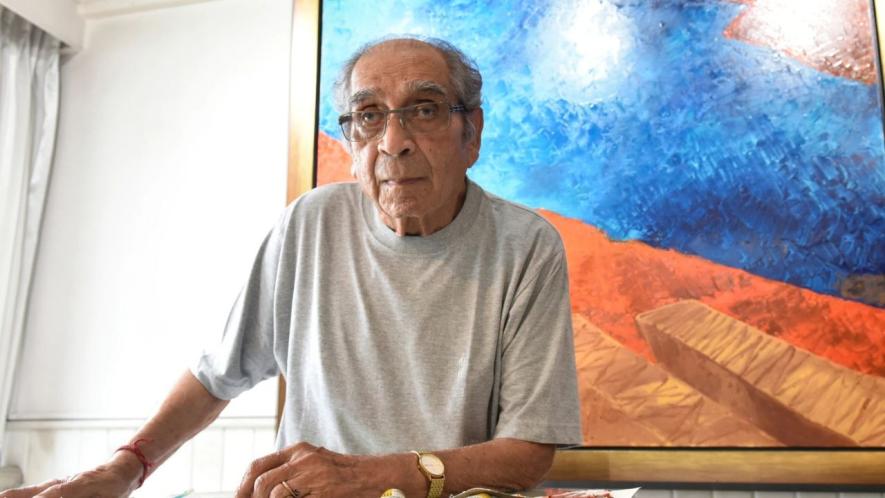Bombay HC Raps Customs Dept for Dubbing Souza and Padamsee’s nudes ‘Obscene’, Orders Release of Artworks

Observing that “every nude painting cannot be styled as obscene,” the Bombay High Court on Friday, October 25, directed the customs department to immediately release seven confiscated ‘nude’ artworks by renowned artists F N Souza and Akbar Padamsee. Observing that the customs department failed to appreciate that “sex and obscenity are not always synonymous,” the court directed that in any event, the artworks should be released within two weeks.
Through this order, the HC quashed and set aside the department’s July 1, 2024, order passed by the Assistant Commissioner of Customs (ACC) that confiscated the artworks by, labelling them under the ‘obscene material’ category and prohibited them for import. On October 21, a bench of Justices Mahesh S Sonak and Jitendra S Jain, while hearing a plea by BK Polimex India Pvt Ltd, a company owned by Mumbai-based businessman and art collector Mustafa Karachiwala, had restrained authorities from destroying the confiscated artworks that were seized in 2023.
This consignment had included seven artworks, including a folio of four erotic drawings by Souza, with one of them titled ‘Lovers’.The batch also included three other pieces by Padamsee, one drawing titled ‘Nude’ and two photographs. In 2022, three nude artworks of Padamsee and four of Souza were purchased at auction houses Roseberys in London, and Lyon & Turnbull in Scotland.
The petitioner firm, through advocates Shreyas Shrivastava, Saurabh Shrivastava and Shraddha Swarup, termed the seizing of artworks and imposing Rs. 50,000 fine ‘arbitrary and illegal’.
“We are satisfied that the ACC’s order suffers from perversity and unreasonableness…The ACC, utterly obsessed with his notions of obscenity, has confiscated and possibly directed the destruction of the artworks of Padamsee and Souza. The ACC relies solely on his conviction that any artwork depicting nudity or sexual intercourse is inherently obscene,” the bench noted.
It added that the ACC “disregarded the artists’ prominence and expertise and the fact that many art experts and judicial precedents had recognised these works as significant artworks and not obscenity.”
“The ACC failed to appreciate that sex and obscenity are not always synonymous. Obscene material is that which deals with sex in a manner appealing to prurient interest (William J Brennan, Jr.). Such an order, in our opinion, is unsustainable and must go,” said the bench.
The order also mentioned that, “the ACC’s personal conviction that any nude portrayal of a woman or any drawings portraying sexual poses is invariably obscene could not or should not have been the fulcrum of his decision.”
Further observing that while the matter cannot be solely decided based on eminence of two artists, the bench said it could not have also not been decided by ACC repeatedly focusing on the fact that artworks were nude and in some cases portrayed sexual intercourse positions and hence they were obscene. “Every nude painting or every painting depicting some sexual intercourse poses cannot be styled as obscene,” the HC observed. The HC added that the petitioner has correctly pointed out that “nude sculptures and art are prevalent in several Indian temples and celebrated for their artistic excellence.”
The bench referred to a Supreme Court judgement of 60 years ago which declared that “in India, the angels and saints of Michelangelo do not need to be made to wear breeches before they can be viewed.” Still in 2024, the ACC prohibited import and ordered confiscation of seven drawings by world-renowned artists on the basis of obscenity, it said.
Justice Sonak, who authored the verdict further remarked, “The customs laws of India do not insist that Michelangelo’s David be fully clothed before he passes through our Customs Borders.”
The judge added, “The ACC cannot lightly and without adverting to relevant considerations assume the mantle of being a spokesperson for community standards….Just as one swallow does not make a summer, so also one such decision of one such assistant commissioner of customs does not make the law on this subject.”
The bench also remarked that several great artists have had to tread an “unfortunate path hedged by those dressed in little brief or even grand or pompous authority” Allowing the plea, the bench held that it was a case of “completely ignoring vital and relevant material and basing the decision on personal preferences and prejudices, which should have no place in decision making by a public authority.”
Get the latest reports & analysis with people's perspective on Protests, movements & deep analytical videos, discussions of the current affairs in your Telegram app. Subscribe to NewsClick's Telegram channel & get Real-Time updates on stories, as they get published on our website.
























